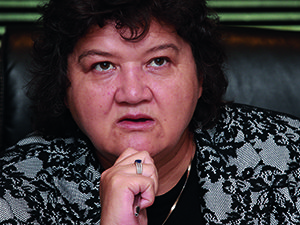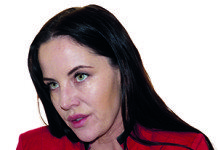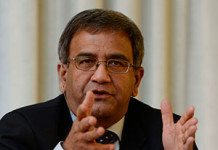
[miningmx.com] – IF there’s one thing that Minister of Public Enterprises Lynne Brown can’t stand it’s inconsistency, especially where facts and figures are concerned. She was after all the Western Cape’s finance MEC for close to four years.
Seated behind a boardroom table on the 16th floor of the ministerial building in the parliamentary precinct, the public enterprises minister explains how the suspension of Eskom’s top four transpired.
“Every time we had a war room meeting and Eskom came into the room, they had different figures, different facts, and different information. Nothing from one war room meeting to the next was consistent.’
So in March this year, she got on a plane to Johannesburg and told the Eskom board that she wanted to see them.
At the meeting, Brown told the board to get their facts straight.
She wanted a “deep dive’ into Eskom’s financial liquidity, its build programme and maintenance plans. “I wanted to know what the exact prices of diesel and coal were and how we arrived at them, seeing that they differ.’
Brown left the board to make its own decision about how it intended to solve the discrepancies. Late that night she received a phone call with the news that the board wanted to suspend four members of Eskom’s executive team, including CEO Tshediso Matona.
“They submitted a formal request which I accepted. I wanted a deep dive, even if it meant suspending the four who headed the areas I was concerned about.’
The Eskom board appointed Dentons, a law firm with an international footprint, to conduct a three-month inquiry into the affairs at the power utility and time’s up. At the end of June, Dentons should have reported back to Brown.
Meanwhile, two of the four suspended executives – Matona and Dan Marokane, executive of group capital, opted to part ways amicably with Eskom.
When Brown was appointed public enterprises minister in May 2014, she inherited a range of ailing state-owned companies, of which Eskom is arguably the rockiest.
Bestowed with junk status by rating agencies Moody’s and Standard & Poor, Eskom grapples with maintenance backlogs, billions of rand of cash shortfalls, ageing plants and a build programme at Medupi and Kusile, which are running about five years behind schedule.
A self-proclaimed pragmatist, Brown will require “Job’s patience’ to allow matters to run their course at Eskom.
“I’d like to get things done quicker than I can breathe,’ she admits. “We have the first 800MW from unit 6 and we have a timeframe for the rest to come on line. But I’m not keen to say exactly when – I want more surety from Eskom.’
For Brown, the arrival of Brian Molefe as Eskom boss, even if it’s just temporary, is a beam of light in an otherwise dark situation. “I’m really pleased that I’ve appointed Brian.’
Known in government and business circles as “Mr Fix It’ for the way he turned the Public Investment Corporation (PIC) around, Molefe, also Transnet CEO, was appointed to the hot seat in March, among other things to sort out load-shedding.
Molefe has boosted morale at the power utility, says Brown. “He has the whole company behind him.’ And with Molefe at the helm there are no unpleasant surprises.
“I know exactly what’s happening and I’m not surprised by anything. If he knows it I’ll soon know it. When he’s seated next to me in a meeting he’ll ask me: “Did you have load-shedding last night? Not? You won’t have tomorrow either.’’
Whether Molefe will go back to his position at Transnet remains to be seen. “We haven’t had that conversation yet,’ Brown says.
“The board has reached an agreement with two of the suspended executives so it does give us space to appoint people to create a team around the CEO.’
As a former premier of the Western Cape, Brown has been praised for her inclusive, non-interfering leadership style – a trait that glimmers through in the trust she is not only placing in Molefe’s leadership skills, but also his conviction that Eskom doesn’t face a coal crisis.
The acting CEO made this assertion at a media briefing ahead of the department of public enterprises’ budget speech. Two weeks later, Brown admitted in a reply to a parliamentary question that Eskom faces a 17 million tonne/year coal shortfall by 2017 at its coal-fired plants.
These conflicting claims have raised the ire of business people, and some experts believe Eskom is “hopelessly underplaying’ the coal supply issue.
Energy analyst Ted Blom, who has done extensive work on Eskom since 2006 believes there is a coal cliff, which will have a much worse effect on South Africa than the current load-shedding. “It [the coal shortage] won’t happen overnight.
It will get a bit worse next year and the year thereafter, but by 2018 Eskom is going to be short by about 60 million tonnes a year (mtpa).’
Brown, however, maintains that Molefe assured her there’s no coal crisis. “The current coal contracts are coming to an end and I think there’s pressure from business when it comes to the end of a contract term and the impression is given that we’re facing a crisis.
“I’ve asked the board to explain to me how they’ll overcome the coal shortage by the end of this year and how we’re going to deal with the continuation and changeover of coal contracts in 2018.
So there’s a process that we’re following. Eskom as a business must know what to do the day after the contract comes to an end.’
Coal companies, especially mining giants, such as BHP Billiton, Anglo American and Exxaro Resources, are less than eager to do business with Eskom, by and large as a result of the cost-plus model.
This model means coal mines that supply to Eskom are financed by the power utility and operated by the mining companies on the basis of a fixed margin.
Would Eskom be prepared to reconsider the cost-plus model given its precarious coal reserve situation?
Brown doesn’t dismiss the possibility outright. “Look, because we still have coal-fired power stations, the cost-plus model was set-up to ensure the security of coal.
If they want to get rid of this model they must bring the business case as to how we provide for coal in the future. I want to know if there is another way of securing coal.’
As for Eskom’s coal procurement policy, which stipulates that companies need 50% plus one share black ownership to supply coal to the power utility, Brown is unapologetic.
When journalists put out feelers earlier about the possibility of changing the ownership requirements for coal providers, she made it clear that ownership patterns need to change.
“Transforming the economy is an imperative. The economy is essentially still in the hands of large white companies.
“We have to create a more equal society that both empowers people and continue to grow the economy,’ she said at a media briefing.
But despite the transformation pressures there are no immediate plans to set up a fund to assist black-owned junior coal producers to develop their businesses, something former Eskom CEO Brian Dames had announced some years ago.
“Eskom’s balance sheet gets priority now,’ Brown says. “Even though I support it Eskom needs to look at its own balance sheet and liquidity moving forward.’











